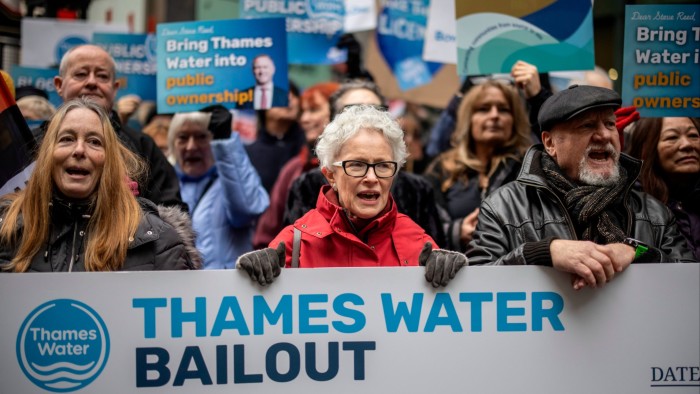Unlock the Editor’s Digest for free
Roula Khalaf, Editor of the FT, selects her favourite stories in this weekly newsletter.
Thames Water only has enough cash to survive little more than five weeks.
The UK’s biggest water provider, which serves 16mn customers in and around London, does not have enough money to repay a £200mn loan due on March 24.
While the taps will keep running even if Thames Water tips into default, it is an existential moment for both the company and the wider system of privatised utilities that has prevailed in England and Wales since 1989.
Even if Thames Water were able to convince its lenders to give temporary forbearance, the debt-ridden utility’s general counsel Andy Fraiser told a London High Court hearing this month that it would still in effect risk “running on vapour”.
Thames Water, already straining under a £19bn debt load, is trying to borrow its way out of trouble. The utility claims that an up to £3bn loan from its top-ranking creditors, which include distressed debt specialists such as Elliott Management, will give it breathing room needed to raise equity from new investors and renegotiate its debts.
The utility needs approval from London’s High Court to implement the rescue loan, however. The judge is due to hand down his decision next week.
The emergency loan faces opposition not just from the company’s lower-ranking creditors — which include another rival camp of hedge funds trying to push through their own loan — but also from a group of environmental campaigners spearheaded by Liberal Democrat MP Charlie Maynard. He is among those pushing for special administration, a form of temporary renationalisation.
The utility also decided on Friday to appeal a decision by Ofwat over the amount by which it can raise its customer bills over the next five years.
The decision to appeal should unlock half the £3bn loan, if approved. But the final outcome also has a bearing on a parallel equity raise that the company is attempting. Thames Water has pledged to shortlist credible bidders by the end of February.
The next few weeks are littered with key deadlines relating to pressing matters that will define the future of the UK’s largest water company.
Many of those dates, listed below, are expected or subject to change.
Thames Water’s tricky road to rescue
February 18 — high court ruling
Mr Justice Leech will hand down his ruling on Thames Water’s £3bn loan plan. While high court judges usually spend months agonising over complex restructuring cases, Leech is acting quickly given the utility’s cash crunch.
February 19 — ‘B’ creditors in court
Lower-ranking “class B” creditors have called a court hearing to propose a rival restructuring plan to provide their own £3bn loan. The applicant is a fund of Polus Capital Management, a London-based credit firm, which owns more than £200mn of B debt by face value.
February — ‘A’ creditors in court
The senior “class A” lenders, allied with Thames Water, were hoping to present their own alternative plan at the same February 19 hearing. This alternative to the alternative would be broadly on the same terms as the £3bn loan the utility has already agreed. The judge, however, has said time constraints will not allow this, meaning they may seek their own court date.
Week of February 24 — POSSIBLE appeal
Justice Leech’s ruling can be appealed. If he approves the loan plan, it can be stayed pending an outcome. Both the B creditors and Liberal Democrat MP Charlie Maynard might seek an appeal, which could be filed in the last week of February.
End of February — bidders selected
Thames Water received “non-binding offers” to inject equity into the utility on February 10. By the end of the month, it should have selected bidders it believes are credible and can progress to the next stage.
March 4 — ‘b’ creditors back in court
The class B creditors have booked this date for a potential “sanction hearing”, mirroring the court hearings Thames Water held in early February. The class A lenders may also now wish to hold their own hearing.
March — class a loan released
Thames Water has said it could take 17 business days to start receiving the first £1.5bn half of the senior creditors’ loan, if approved, which will be drip fed into the utility month by month. The second £1.5bn instalment was dependent on Thames Water challenging Ofwat’s settlement, which happened on February 14, but has not yet been fully committed by the lenders.
March 24 — the money runs out
Thames Water has £200mn of debt due, which it says it cannot repay if its new loan is not yet available. Without this, it may be forced to ask Ofwat and the UK government to call a special administration.




